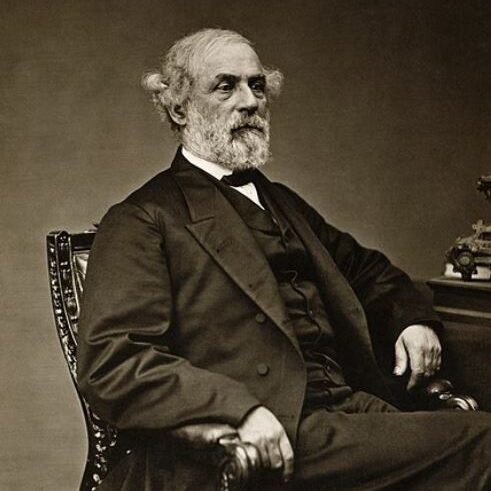General Robert E. Lee is a significant figure in American History for his role in the Civil War. However, what happened to Lee after the war?
Following the Civil War, General Robert E. Lee faced a new set of challenges as he grappled with defeat and the daunting task of rebuilding his life. Transitioning from military leader to civilian, Lee embarked on a journey marked by resilience and introspection.
Join us as we explore the post-war experiences of General Robert E. Lee, one of America’s most iconic figures.
1. General Robert E. Lee’s Post-War Challenges
After the Confederate surrender, General Robert E. Lee faced a tumultuous period. The aftermath of the Civil War presented Lee with obstacles that tested his resilience and determination.
Loss of Property
The defeat resulted in the confiscation of General Robert E. Lee’s vast landholdings, including his cherished family estate, Arlington House. This wasn’t just a loss of property; it was the symbolic dismantling of a way of life.
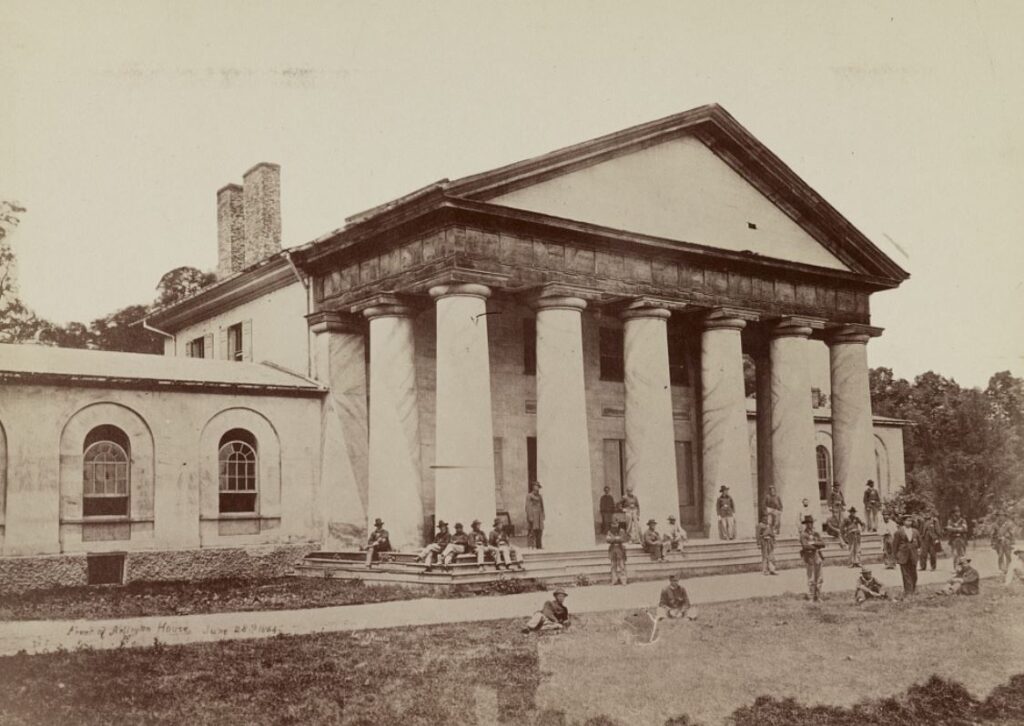
Arlington House, once a place of leisure and joy for General Robert E. Lee, was transformed into Arlington National Cemetery, a permanent resting ground for Union soldiers.
Lee’s losses were symbolic of the immense displacement and dislocation experienced by countless Southerners. Families lost not just loved ones on the battlefield, but also their homes, and farms.
The story of Lee’s Arlington estate serves as a reminder of the immense cost of the Civil War, a cost that went far beyond the battlefield and left an mark on the nation’s social fabric.
Rebuilding Life
General Robert E. Lee faced the daunting task of rebuilding his life from the ground up. The challenges were immense.
Financial Insecurity: The war had devastated the South’s economy. Gone were the days of sprawling plantations and a life of leisure. General Robert E. Lee was accustomed to a certain level of affluence. He now had to grappled with financial insecurity. The specter of poverty loomed large, casting a long shadow over his family’s future.
Loss of Livelihood: Lee’s military career was over. The skills and experience that had defined him were no longer relevant in a peacetime setting. Finding new work, especially at his age and given the political climate, wouldn’t be easy.
Navigating Uncertainty: The South was a land in ruins, its social and political structures fractured. The path forward was shrouded in uncertainty.
The initial years after the war were undoubtedly a time of immense struggle, forcing him to confront a future far different from the one he had envisioned.
Emotional Toll
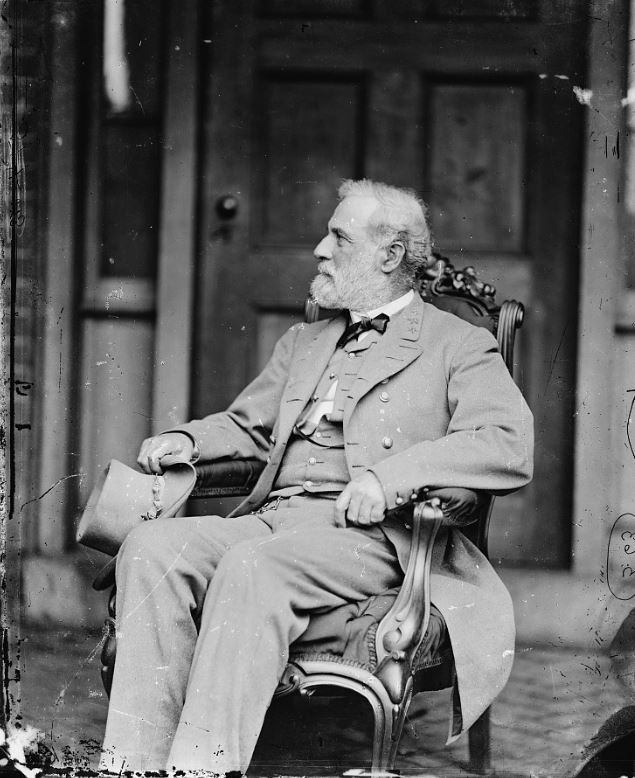
The weight of defeat bore heavily on General Robert E. Lee’s shoulders.
As a revered military leader, he keenly felt the burden of responsibility for the suffering endured by his soldiers and fellow Southerners. The loss of comrades, coupled with the shattered dreams of a Confederate victory, cast a long shadow over Lee’s psyche, prompting moments of introspection and soul-searching.
General Robert E. Lee remained committed to finding a path forward and contributing positively to the reconstruction efforts in the South. Embracing a spirit of reconciliation, Lee sought to heal the wounds of division and chart a course toward a brighter future for himself and his community.
2. General Robert E. Lee’s Pardon Request
The years following the Civil War were a period of immense upheaval and uncertainty. For Robert E. Lee, this era presented a particularly difficult set of challenges. Defeated and facing potential prosecution for treason, Lee applied for a pardon from the U.S. government.
A Pardon or an Admission of Guilt?
General Robert E. Lee’s request for a pardon in June 1865 was a complex move. President Andrew Johnson’s amnesty proclamation offered a path back to citizenship, but it came with conditions. Lee, who hadn’t met all the requirements (oath and property value), faced a dilemma. Seeking a pardon could be interpreted in several ways:
- Respecting the Law: Robert E. Lee, despite his reservations, might have felt it was his duty to comply with the established process for regaining citizenship.
- Avoiding Trial: The pardon could have been a way to sidestep a potentially humiliating and divisive public trial.
- Leading by Example: By seeking a pardon, Robert E. Lee might have hoped to encourage other Southerners to follow suit and participate in Reconstruction.
In the South, Lee’s decision unsurprisingly met with mixed reactions.
Some may have seen it as a pragmatic move, a necessary step to rebuild their lives. Others, however, might have viewed it as a betrayal of the Confederacy or a capitulation to the North. Many believed that the pardon admitted secession, the creation of the Confederacy, and the fighting, fighting against the northern invasion were all wrong.
Ultimately, Lee’s request for a pardon never received a formal answer from President Johnson.
Prosecutors never formally indicted him, but the threat of prosecution hung over him. This left Lee in a precarious position.
3. Transition to Civilian Life
General Robert E. Lee’s transition from battlefield commander to civilian leader was characterized by a shift in roles and responsibilities.
Following the Confederate surrender at Appomattox, Lee faced the daunting task of reintegrating into civilian society after years of military service.

The transition required him to adapt to a drastically different set of circumstances, as he navigated the challenges of post-war reconstruction and sought to redefine his identity beyond the confines of the battlefield.
An Unexpected Offer: Rebuilding Washington College
While Lee’s pardon remained undecided, an opportunity arose that would shape the remainder of his life. Washington College, a war-torn institution in Lexington, Virginia, was searching for a new president. The trustees, recognizing Lee’s reputation and leadership skills, made him a bold offer.
Lee himself, lacking a pardon and with clear political views, wasn’t an obvious choice.
However, Lee’s acceptance of the presidency, despite these uncertainties, speaks volumes about his character. His letter accepting the position explicitly stated,
“I think it the duty of every citizen in the present condition of the country to do all in his power to aid in the restoration of peace and harmony and in no way to oppose the policy of the state or general government directed to that object.”
Presidency of Washington College
Amidst the uncertainties of post-war life, General Robert E. Lee made the decision to accept the presidency of Washington College in Lexington, Virginia.
Renowned for his leadership qualities and unwavering commitment to education, Lee embraced the opportunity to contribute to the intellectual and moral development of future generations.
Lee’s tenure as president of Washington College played a pivotal role in shaping the institution’s post-war identity and guiding its trajectory in the aftermath of the Civil War. His leadership provided a steady hand during a period of profound transformation, instilling a sense of purpose and direction that resonated throughout the campus community.
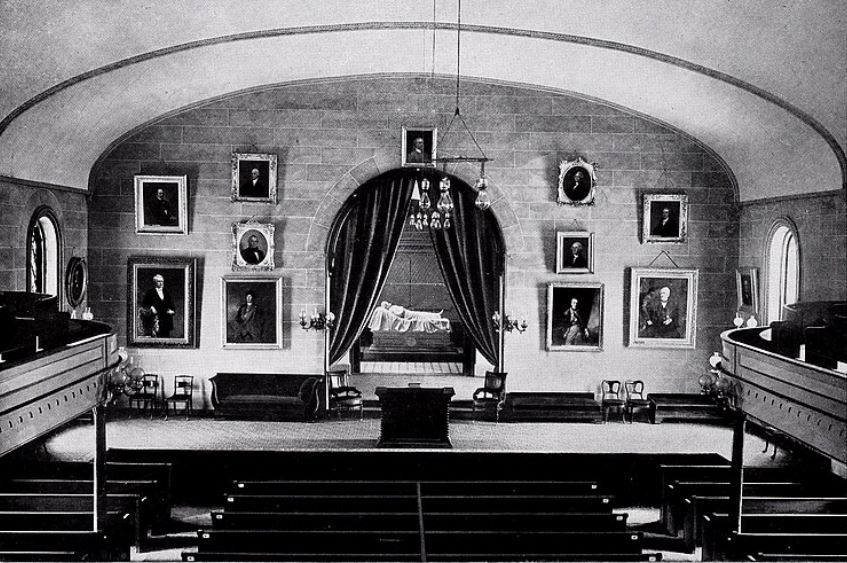
Under Lee’s stewardship, Washington College underwent a remarkable transformation, emerging as a beacon of hope and renewal in the war-torn South.
His emphasis on academic excellence, moral integrity, and civic responsibility laid the foundation for a new era of growth and prosperity, positioning the college as a bastion of learning and enlightenment in the post-war landscape.
Lee’s decision to assume the presidency of Washington College underscored his enduring commitment to service and his steadfast belief in the power of education to uplift and empower individuals and communities.
As we reflect on General Lee’s transition to civilian life and his influential role as president of Washington College, we gain valuable insights into the resilience and fortitude that defined his post-war journey.
Through his tireless efforts to rebuild and renew, Lee influenced mark on the the countless lives he touched, embodying the timeless virtues of courage, integrity, and devotion to duty.
4. Legacy of Reconciliation
General Robert E. Lee’s legacy of reconciliation stands as a testament to his unwavering commitment to healing the wounds of the Civil War and forging a path towards unity and understanding in the post-war South.
Efforts Towards Reconciliation
In the aftermath of the conflict, General Robert E. Lee emerged as a leading advocate for reconciliation, recognizing the need to overcome sectional divisions and fostering a spirit of mutual respect and cooperation.
Lee’s interactions with former adversaries, particularly Ulysses S. Grant, epitomized his unwavering commitment to reconciliation and healing in the aftermath of the Civil War.
When Lee met with Grant for the historic surrender at Appomattox Court House, his conduct set the tone for future encounters. Despite the solemnity of the occasion, Lee’s respectful demeanor and courteous treatment of Grant demonstrated his willingness to extend an olive branch and seek common ground.
Beyond Appomattox, documented interactions between Lee and Grant are scarce. Despite the lack of personal connection, there’s evidence of respect. Lee, ever the gentleman, praised Grant’s generalship. Grant, in turn, acknowledged Lee’s military prowess and expressed sympathy for his difficult post-war situation.
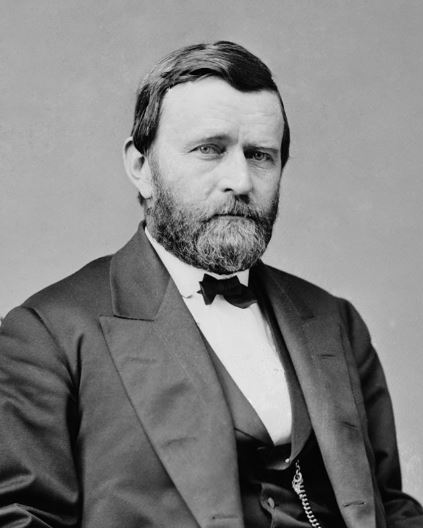
Lee approached post-war interactions with a remarkable sense of grace and magnanimity.
Commitment to Fostering Unity
Throughout his tenure as president of Washington College, Lee remained dedicated to fostering unity and understanding among all members of the college community.
By emphasizing the importance of education as a means of promoting mutual understanding and cooperation, Lee sought to instill a sense of shared purpose and common humanity that transcended the divisions of the past.
Lee’s work at Washington College was instrumental in promoting education as a vehicle for reconciliation and healing in the post-war South.
Through his leadership and vision, he transformed the college into a beacon of enlightenment and intellectual inquiry, where students from all backgrounds could come together to learn, grow, and forge lifelong bonds of friendship and camaraderie.
5. General Lee’s Final Days

In the years following the Civil War, General Robert E. Lee grappled with persistent health issues.
Despite his resilience in battle, the toll of war and advancing age took a heavy toll on his well-being. Lee’s health struggles included angina pectoris and deteriorating cardiovascular health, likely exacerbated by the stress of wartime experiences.
General Robert E. Lee’s declining health posed significant challenges in his post-war life. As his condition worsened, he faced physical limitations and emotional upheaval. Despite his characteristic dignity and fortitude, the toll on his well-being was undeniable.
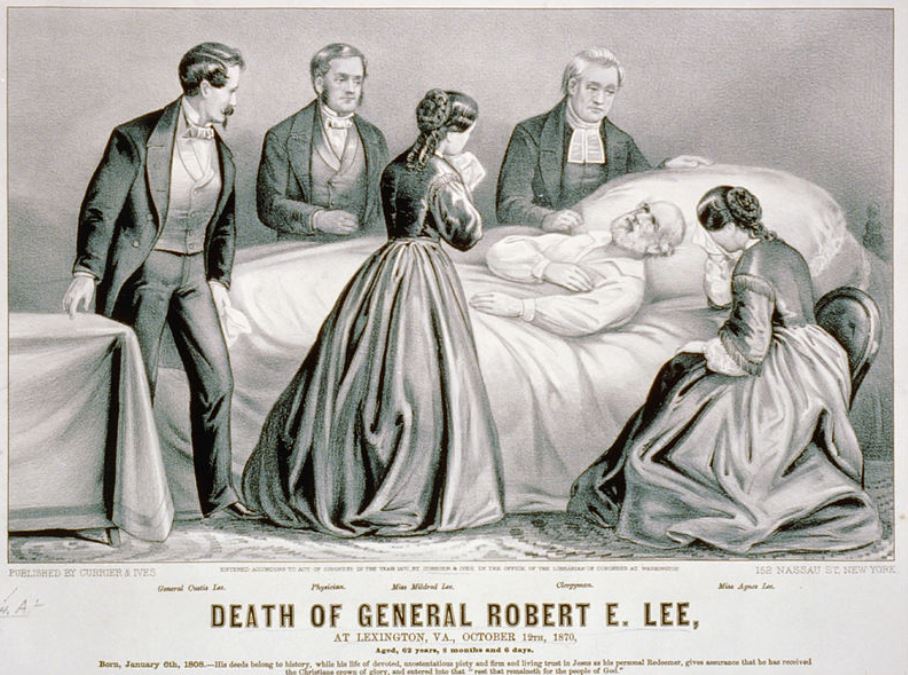
In his final days, Lee’s health deteriorated rapidly. His physical condition impeded daily activities and diminished his quality of life.
On October 12, 1870, at the age of 63, General Robert E. Lee passed away.
His death marked the end of an era and left a profound impact on the nation, particularly in the South, where he was revered as a symbol of honor and resilience.
6. General Robert E. Lee’s Legacy in American History
General Robert E. Lee’s legacy remains deeply ingrained in American history, evoking complex and often contentious interpretations.
His leadership during the Civil War and subsequent efforts towards reconciliation have left a lasting imprint on the American consciousness.
However, the memory of Robert E. Lee continues to be a subject of debate and controversy. While many view him as a symbol of Southern heritage and honor, others condemn his defense of slavery and allegiance to the Confederacy.
Ongoing discussions surrounding Lee’s legacy highlight the complexities of historical memory and the ways in which it intersects with issues of race, identity, and national unity.
Despite the controversies surrounding his memory, Robert E. Lee continues to be remembered in various ways across the United States.
Monuments, statues, and landmarks bearing his name dot the Southern landscape, serving as reminders of his enduring influence. Commemorations and events dedicated to preserving his legacy attract supporters and critics alike, reflecting the ongoing dialogue surrounding Lee’s place in American history.
Further Reading
If you enjoyed this article, you may be interested to read more about the American Civil War, or perhaps read about the bloodiest battles of the Civil War or the South’s important victories. Read here for more general American history.

